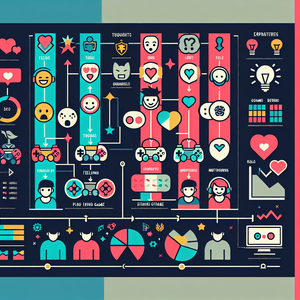The Science Behind Game-Based Learning: Why Blooket Works

At the heart of game-based learning lies the principle of engagement. Educational theorist Jean Piaget’s Constructivism posits that learners actively construct knowledge through experiences. Platforms like Blooket create immersive environments that invite exploration, creativity, and problem-solving. This active involvement is pivotal for deeper understanding and information retention, as learners are not merely passive recipients of knowledge but active participants in their learning journey.
Elements of Blooket that Enhance Learning
Blooket incorporates several crucial elements that align with the principles of game-based learning: 1. Interactivity and Competition: The platform allows students to engage in live games where they can compete against their peers. This competitive aspect is a powerful motivator, as research indicates that social interaction can significantly enhance learning outcomes. The thrill of competition encourages students to immerse themselves in the content, driving both engagement and retention. 2. Immediate Feedback: One of Blooket’s standout features is its provision of instant feedback. This aligns with formative assessment principles, allowing learners to receive timely insights about their performance. Immediate feedback is critical for identifying areas for improvement, reinforcing understanding, and ultimately leading to better retention of knowledge. The ability to learn from mistakes in real-time fosters a growth mindset among students. 3. Variety of Game Modes: Blooket offers a diverse array of game modes, ranging from classic trivia to creative themes that resonate with various interests. This variety allows educators to tailor their approach based on the unique needs and preferences of their students. Research supports the notion that varied instructional methods cater to different learning styles, enhancing overall engagement and efficacy.
Evidence of Effectiveness
Numerous studies have demonstrated the effectiveness of game-based learning within educational settings. A meta-analysis published in the Journal of Educational Psychology reveals that game-based learning environments significantly improve student engagement and achievement compared to traditional instructional methods. The findings indicate that Blooket’s design, which integrates principles of game mechanics and learner engagement, aligns with these positive outcomes, suggesting it can lead to enhanced educational results. Anecdotal evidence from educators who employ Blooket in their classrooms further underscores its effectiveness. Teachers have reported increased participation rates and heightened enthusiasm among students. Notably, students who previously struggled with conventional learning methods are more inclined to engage with the material when presented in a game format. This shift in attitude is crucial for educators striving to cultivate a genuine love for learning among their students.
In conclusion, Blooket exemplifies the transformative potential of game-based learning to reshape educational experiences. By grounding its design in established psychological and educational theories, the platform not only captivates students but also enhances their ability to retain and apply knowledge.
Educational Game Designer
Kahoot!, Nearpod, Pearson
Core Responsibilities
Develop engaging educational games that align with curriculum standards and learning objectives.
Collaborate with educators and subject matter experts to ensure the content is pedagogically sound and relevant.
Conduct user testing and gather feedback to iterate and improve game mechanics and learning outcomes.
Required Skills
Proficiency in game design software (e.g., Unity, Unreal Engine).
Strong understanding of educational theories and principles of game-based learning.
Excellent communication skills for collaborating with educational stakeholders.
Learning Experience Designer (LXD)
LinkedIn Learning, Coursera
Core Responsibilities
Create and design interactive learning experiences that incorporate gamification principles to enhance engagement.
Analyze learner needs and define learning objectives that align with educational standards.
Evaluate the effectiveness of learning programs through data analysis and user feedback.
Required Skills
Experience with learning management systems (LMS) and authoring tools (e.g., Articulate Storyline, Adobe Captivate).
Strong analytical skills to assess learner data and adapt programs accordingly.
Familiarity with graphic design and multimedia production to enhance learning materials.
Educational Technology Specialist
Google for Education
Core Responsibilities
Support educators in integrating technology into the classroom, focusing on game-based learning tools like Blooket.
Provide training and professional development for teachers on the effective use of educational technology.
Assess and recommend new technologies that can enhance teaching and learning experiences.
Required Skills
Knowledge of current educational technologies and digital learning trends.
Strong problem-solving skills and the ability to troubleshoot technical issues.
Excellent interpersonal skills for working with diverse groups of educators and students.
Data Analyst in Education Technology
Core Responsibilities
Analyze usage data from educational platforms like Blooket to assess engagement and learning outcomes.
Develop reports and dashboards that provide insights into student performance and program effectiveness.
Collaborate with product teams to inform the design and improvement of educational tools based on data findings.
Required Skills
Proficiency in data analysis tools (e.g., R, Python, SQL) and visualization software (e.g., Tableau).
Understanding of educational metrics and assessment data.
Strong critical thinking and communication skills to present findings to stakeholders.
Curriculum Developer with a Focus on Game-Based Learning
Core Responsibilities
Design and develop curriculum materials that incorporate game-based learning strategies for K-12 classrooms.
Collaborate with teachers to ensure alignment with educational standards and student needs.
Conduct workshops and training sessions to help educators implement game-based learning in their classrooms.
Required Skills
Strong background in curriculum design and instructional strategies.
Familiarity with game design principles and their application in educational contexts.
Ability to evaluate curricular effectiveness through feedback and student performance data.


